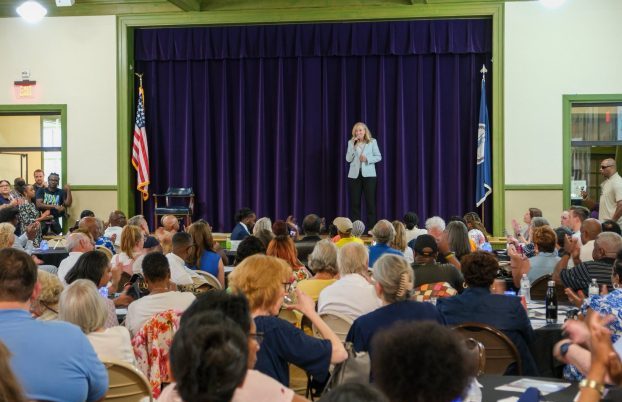Save Local Pharmacies Act signed by governor. So what changes?
Published 6:32 am Tuesday, May 6, 2025
|
Getting your Trinity Audio player ready...
|
It went down to the wire, so to speak, with Virginia Gov. Glenn Youngkin not announcing his decision until minutes before the deadline. But in the end, Youngkin did respond on Friday, May 2, signing the Save Local Pharmacies Act into law.
The goal of the new law is to streamline the Medicaid process for local pharmacies, especially independent ones. It will create one single, state-contracted Pharmacy Benefits Manager (PBM) for Medicaid. Rather than seeing pharmacies deal with multiple departments or contacts in an attempt to get reimbursed for Medicaid patients, there will just be one central hub they work with. And other states have seen impressive results when making the switch, claiming they cleaned up a lot of waste.
West Virginia reported saving $122 million in the first year after making the switch. Ohio officials, meanwhile, claimed the state saved $245 million in one year; Kentucky said it saved $283 million over two years and Texas said it saved $438 million in two years after making the switch.
One central hub means one point of contact, rather than sending pharmacy representatives bouncing from phone call to phone call, or email to email, trying to get connected with the right person who can process the reimbursement.
It was even one of those rare bills that raced through the General Assembly, passing 40-0 in the Senate, with the House version also getting overwhelming approval 92-2. But the first time it was submitted to Youngkin, he suggested a substitute. He approved of the bill’s general purpose, but wanted to see what the impact would be.
What caused the delay?
The new law had been the subject of a back and forth over the last month, with the governor proposing changes and the General Assembly majority rejecting them. Youngkin had wanted the concept studied, arguing that we needed data to prove the claims made. Both the House and Senate disagreed, arguing that a study wastes time when other states have already put this into practice and saved hundreds of millions of dollars.
Youngkin recommended hiring an independent consultant, to do “a comprehensive evaluation of the potential benefits, cost savings and implementation considerations associated with utilizing a single third-party administrator,” his substitute bill reads. “This evaluation shall include an analysis of financial efficiencies, improved transparency and the impact on patient access to pharmacy services, including community critical access pharmacies, along with timelines and cost for both implementation and ongoing operation and maintenance.”
What will the impact be? Will the changes help improve patient access? That’s what Youngkin wanted studied by this consultant, who could not, in the governor’s recommendation, be currently employed by any managed care organization or Medicaid group. His recommendation was rejected in the Assembly’s April veto session, with the original bill sent back for his consideration. And so the bill sat on the governor’s desk for one month, up until the final minutes before the deadline of 11:59 p.m. on Friday, May 2 for him to sign or reject. In the end, Youngkin signed the bill into law, saying if changes are needed, it will be up to the General Assembly to make them.
The bill advances, in part “our shared mission to make Virginia the best place to live, work and raise a family and future General Assembly sessions can improve the legislation,” Youngkin said in a statement Friday night. “In a divided government, no one is going to get 100 percent of what they want, and we must work across the aisle to serve the common interests of Virginians.”
Save Local Pharmacies Act impact
Pharmacies across the Commonwealth are closing at an accelerating pace. The study done earlier this year in the Journal of the American Pharmacists Association by Virginia Commonwealth University and the Virginia Board of Pharmacy identified 51 pharmacy deserts — communities where residents face extreme barriers to accessing essential medications and pharmacy services. It comes as a surprise to no one that Buckingham and Cumberland were right on the edge of what’s considered a ‘pharmacy desert’, due to lack of multiple options.
Already, five other Virginia counties have no pharmacies at all, and 15 counties have only one pharmacy, leaving entire populations vulnerable.
Multiple pharmacy and drug associations in Virginia had called for approval of the bill. The Virginia Pharmacy Association (VPhA), Virginia Association of Chain Drug Stores (VACDS), Pharmacists United for Truth and Transparency (PUTT), the Virginia Community Pharmacy Association (VCPA), and CPESN Virginia all released statements arguing a study into this isn’t needed. They pointed to the existing data from other states that have implemented the change as evidence that it works.
“We have ample evidence, including data from Virginia’s own DMAS study, as well as proven success stories from Ohio, Kentucky, West Virginia, and Texas, demonstrating the effectiveness of Medicaid pharmacy reform,” said Steven Hylton with the Virginia Community Pharmacy Association. “Implementing a single, transparent PBM is a viable solution that can ensure patients maintain access to their local pharmacies.”
The new law’s creator, Virginia State Sen. Aaron Rouse, said the Save Local Pharmacies Act will also bring some transparency to drug prices, while making sure independent pharmacies don’t get abused by unfair reimbursement practices.
“(This) is a win for every Virginian who relies on their neighborhood pharmacy for trusted, accessible care,” Rouse said. “This legislation ensures that local pharmacies can continue to serve as a critical piece of our healthcare system, especially in rural and underserved areas.”






